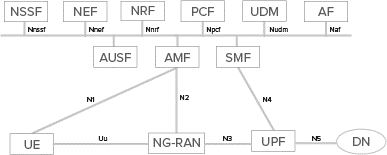
Comprehensive testing of the 3GPP N2 interface from the 5G gNodeB
Comprehensive testing of the 3GPP N2 interface from the 5G gNodeB
Testing the 3GPP N2 interface is an essential task, as it enables connection from the AMF to the 5GC. Evolver offers full N2 interface support, allowing individual and mass customised testing – at scale – for 5G service assurance and node validation.
Control and User Plane Separation, commonly known as CUPS, was introduced in 3GPP R14 to decouple control signalling from user session traffic in the 5G Core (5GC) network. This was an important move as it supports the introduction of edge computing and a more distributed network architecture, which is key for high-speed, low latency applications, such as connected cars.
The N2 interface is an essential component of this decoupling as it links the Access Network – NG-RAN (gNodeB) or non-3GPP WLAN – with the Access and Mobility Management Function (AMF) in the 5G Core (5GC). gNodeB is a 3GPP-compliant implementation of the 5G-NR base station. It consists of independent Network Functions, which implement 3GPP-compliant NR RAN protocols
The N2 interface is essential for enabling CUPS
The N2 interface is primarily used for connection management, UE context and PDU session management, and UE mobility management. But, in addition, it also transports Non-Access Stratum (NAS) signalling between the UE and AMF (for that specific UE), including access control, authentication and authorisation, and session management procedures.
The AMF, meanwhile, coordinates network handovers between base stations, and allows users to connect to the 5G network and access the services they are subscribed to as they move around. As such, it helps manage the high number of devices (including IoT) connected to the 5G network.
The N2 interface is therefore critical because, before a service can be accessed, the UE must be connected to the network. While session control is now handled by the new Session Management Function (continuing the decomposition initiated with CUPS), the UE context is the responsibility of the AMF. So, before any traffic or session can be initiated, the UE context, location - and more - need to be considered.
Put simply, N2 handles control-plane signalling, enabling each of these factors to be considered. As a result, it means that any 5G test solution must support N2 in order to generate and validate realistic user traffic.
The AMF also coordinates network handovers between base stations – in other words, if you want to emulate subscriber mobility as part of behavioural testing, you need to be able to interact with the AMF via this interface.
Emblasoft Evolver for comprehensive, flexible N2 interface testing
Emblasoft Evolver provides a comprehensive solution to these, and many other, challenges. As well as individual test scenarios, Evolver can also perform mass testing by emulating millions of subscribers and ensuring performance under realistic load levels.
In this context, Evolver acts as a gNodeB and effectively mimics test messages from emulated UE devices to the AMF, enabling validation of service testing and verification.
Each test case can be configured using different criteria, which enables fine-grained modelling of realistic traffic from real subscribers in the network to emulate real-world conditions. As such, it enables validation of the N2 interface under lab conditions in test networks (where no 5G Core network is available) or in live networks.
It means that Evolver can test how the network performs under different loads, with different traffic scenarios and for a realistically diverse mix of subscribers. As a result, end-to-end characteristics of the whole 5G core network can be tested.
In addition, node-specific testing can be performed for different nodes in isolation – such as the AMF, SMF and others – AUSF, PCF, UDM, and so on, as illustrated in Figure 1. This allows both operators to test the network before and during deployment, as well as for vendors to validate functionality for commercial offers.
This latter point is important, because securing multi-vendor networks is a key goal for many operators. By enabling testing of individual nodes, and AMF from one vendor can be validated during integration with, for example a UPF solution from other vendors.
Figure 1: 5G SA Core

Support for testing N2 with network slicing
As network slicing becomes a commercial reality, the same solution will also enable the validation of end-to-end performance and characteristics of different network slices in parallel, through emulation of the N2 interface. Consequently, Evolver provides operators and vendor, with a clear evolution path towards the next step in realising full-fledged 5G performance.
Emblasoft N2 testing supports simulation of part of NG-RAN according to 3GPP TS 38.413 version 16.5 towards the AMF. It offers fine grain control for the N2 and NGAP Procedure Support, including:
- PDU Session Management Procedures
- PDU Session Resource Setup
- PDU Session Resource Release
- UE Context Management Procedures
- Initial Context Setup
- UE Context Release (AMF Initiated)
- Transport of NAS Messages Procedures
- Initial UE Message
- Downlink NAS Transport
- Uplink NAS Transport
- Reroute NAS Request
- Interface Management Procedures
- NG Setup
- AMF Configuration Update
- NG Setup
- NG Reset
- Error Indication
In addition, it offers PDU Session Management Messages (Setup Request / Setup Response / Release Command / Release Response), UE Context Management Messages (including Setup Request / Setup Failure / Release Command and Release Complete, among others), and multiple NAS Transport Messages and Interface Management Messages.
Our testing solution also offers multiple configurable settings for N2 testing, providing great flexibility and variety of test cases. For example, it supports configurable gNodeB settings, such as GNB Identifier and AMF Route List, gNodeB Cell Settings (including number of cells, TAC, Slice/Service Type and optional Slice Differentiator) and 5G NAS Settings.
It also offers a wide variety of N2 Simulation Settings:
- Registration (RAN service node, 5GS Registration type, Routing Indicator and others)
- De-Registration (NAS service node, De-registration type and NAS_Release)
- PDU_SESSION (PDU Session Identity, DNN, S-NSSAI, Include ‘Extended protocol config options’ and so on)
- PDU_SESSION_RELEASE (Include ‘5GSM Cause’)
- DATA (including Payload Type, packet size, Send interval, Source port range)
- PING
Evolver also supports a large range of Statistics for N2 tests, including different kinds of NGAP statistics, 5G NAS statistics and 5G Simulation statistics, providing a comprehensive breakdown of a huge number of variables and combinations of test use cases.
Emblasoft Evolver is a comprehensive, highly flexible and customisable, vendor-neutral test solution for end-to-end validation of N2, as well as other interfaces, under lab conditions and in live networks, making it one of the most powerful testing tools currently available for 2G-5G network validation.
To find out more, get in touch to request our N2 interface technical support guide.